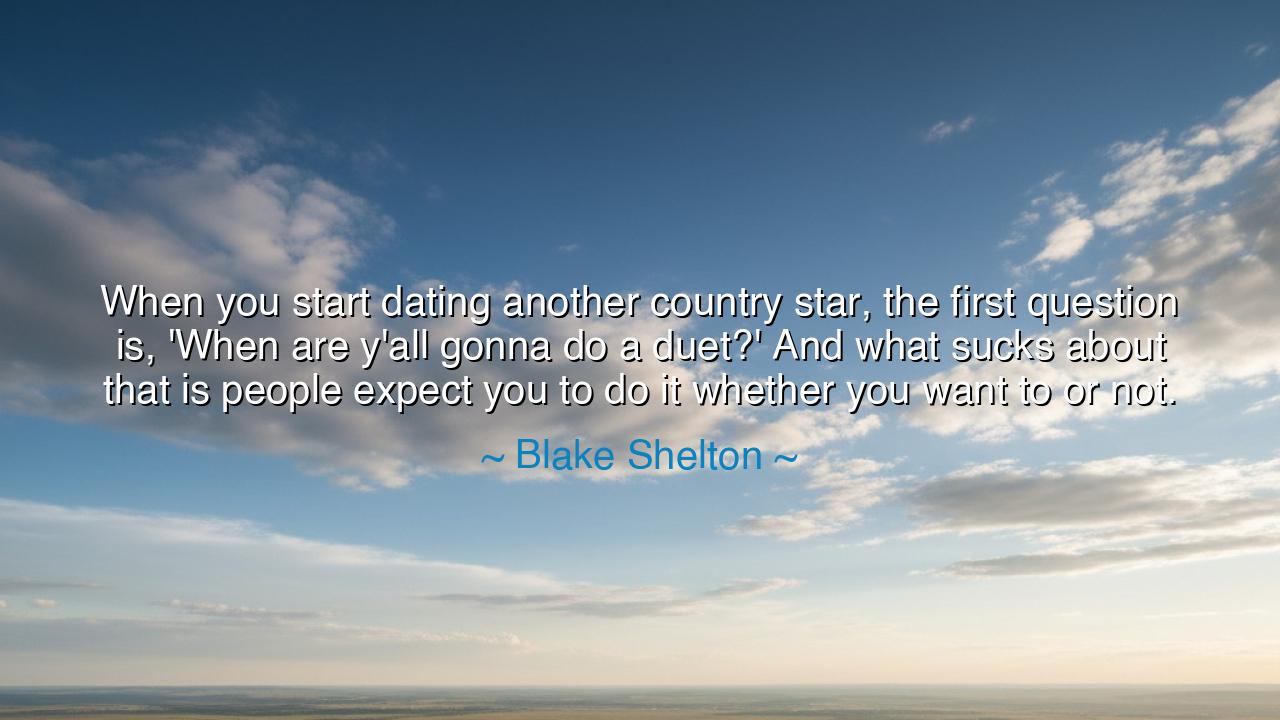
When you start dating another country star, the first question
When you start dating another country star, the first question is, 'When are y'all gonna do a duet?' And what sucks about that is people expect you to do it whether you want to or not.






In the market square of fame, where lanterns are bright and the crowd chants for spectacle, a singer speaks a plain sorrow: “When you start dating another country star, the first question is, ‘When are y’all gonna do a duet?’ And what sucks about that is people expect you to do it whether you want to or not.” Hear the thud inside the twang. The line is a small protest against a great machine—the world’s thirst to turn private affection into public merchandise, to bind two hearts together with a contract written by applause.
The ancients knew this pressure by other names. When kingdoms joined by marriage, courtiers clamored for pageants; when poets loved poets, salons demanded a co-authored ode. The crowd’s desire is not always cruel, but it is hungry. It asks for a duet where a quiet walk might be holier, for a headline where a whispered harmony would be truer. Thus the singer’s complaint becomes a warning: expectation, untempered by love, is a harness that rubs even the gentlest neck raw.
Mark the craft at stake. A country star builds songs from grain and weather—breakfast-table talk, roadside signs, the ache of a Wednesday at 2 a.m. To weld two such crafts together is no simple stitch; it asks for timing, trust, and a shared center of gravity. When people—even well-meaning—expect the union to bear a tune on command, they invite a counterfeit: a chorus shaped by pressure rather than belonging. The ancients would say: do not ask the vine to fruit in winter, nor demand that two instruments, still tuning, perform before they know each other’s breath.
Consider a tale from the same road. Johnny Cash and June Carter sang together, yes—but only after seasons of friendship, respect, and the hard apprenticeship of life’s storms. Their great duets were born not from clamor but from consonance, not from the market’s clock but from the heart’s metronome. Contrast this with pairings assembled by producers for the sake of charts: the voices blended on paper, the photos gleamed, but the song, lacking a soul, fell like rain on oiled leather—there, and then gone. The lesson is not that couples must avoid the studio; it is that music—like love—refuses to be bullied into beauty.
This pressure lives beyond stages. Lovers in ordinary towns feel the same script: “You’re dating, so when’s the trip, the ring, the joint post, the shared hobby?” These are smaller duets, but the danger is the same: to let the gallery choreograph the dance. The wise build a room inside the house of love where no audience is allowed. In that cloister, the question is not “What will they think?” but “What fits our truth?” When the inner answer ripens into an outer act, the world may receive it; until then, the door stays latched.
The saying also teaches mercy for the artist’s calling. Each voice has its weather—keys it can’t sing today, stories it isn’t ready to tell. A forced duet can bruise an instrument and embitter a craft. Better a long season of solo songs than a brittle collaboration that makes the heart distrust its own ear. To decline the crowd’s timeline is not arrogance; it is stewardship. Even prophets, the elders remind us, kept silence until the word burned clean.
Take from this a clear lesson and a short rule of life: authenticity before aggregation; covenant before choreography. Practices for the road: (1) Name your “why”—as artists or lovers—so the people’s expectations do not become your compass. (2) Build a sabbath of privacy: hours or days when no one else’s wants are consulted. (3) If collaboration is right, let it be chosen, time-bound, and joyful; if not, bless each other’s act and keep your lanes. (4) Speak one sentence to the crowd—kind, firm, sufficient: “We’ll sing together when it’s true.” In this way, your dating remains human, your country star soul remains free, and any duet you finally offer will ring like something born of love rather than demanded by noise.






AAdministratorAdministrator
Welcome, honored guests. Please leave a comment, we will respond soon